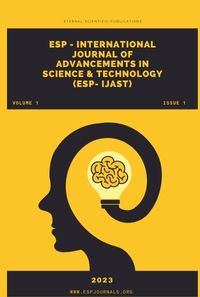ESP International Journal of Advancements in Science & Technology [ESP-IJAST]
Citation :
Kishore Gade, 2025. "The Ethics of Intelligence: Navigating AI's Impact on Society" ESP International Journal of Advancements in Science & Technology (ESP-IJAST) Volume 3, Issue 1: 26-34.
Abstract :
Artificial Intelligence (AI) is rapidly reshaping the fabric of society, influencing everything from healthcare and finance to entertainment and education. Its ability to process vast amounts of data, automate tasks, & drive innovation holds immense potential to improve lives and solve some of the world's most pressing challenges. However, as AI systems become more integrated into daily life, they bring many ethical concerns that cannot be ignored. One pressing issue is the bias embedded in AI algorithms, often reflecting the data they are trained on, which can perpetuate and even amplify existing inequalities. Decisions made by AI systems can impact everything from job recruitment to criminal sentencing, raising questions about fairness, accountability, and transparency. In parallel, the widespread adoption of AI has sparked debates about privacy, as these technologies often rely on personal data, leading to concerns over surveillance and the erosion of individual rights. Additionally, the future of work is being reshaped by automation, with AI poised to displace specific jobs while creating new opportunities, further underscoring the need for policies that promote workforce adaptation and equitable economic growth. As AI evolves, it also challenges long-held ideas about creativity, authorship, and even the nature of human intelligence. Addressing these ethical dilemmas requires collaboration between governments, tech companies, and civil society to establish clear guidelines and frameworks that ensure AI serves humanity's best interests. Public awareness and participation are crucial in shaping AI development, ensuring that the technology aligns with human values & fosters inclusive progress. By engaging in open dialogue, promoting transparency, and prioritizing ethical considerations at every stage of AI's lifecycle, society can mitigate risks while unlocking AI's transformative potential. The path forward lies in balancing innovation with responsibility, striving to create AI systems that are powerful but also just, equitable, and aligned with the collective good.
References :
[1] Whittlestone, J., Nyrup, R., Alexandrova, A., Dihal, K., & Cave, S. (2019). Ethical and societal implications of algorithms, data, and artificial intelligence: a roadmap for research. London: Nuffield Foundation.
[2] Winfield, A. F., & Jirotka, M. (2018). Ethical governance is essential to building trust in robotics and artificial intelligence systems. Philosophical Transactions of the Royal Society A: Mathematical, Physical and Engineering Sciences, 376(2133), 20180085.
[3] Etzioni, A., & Etzioni, O. (2017). Incorporating ethics into artificial intelligence. The Journal of Ethics, 21, 403-418.
[4] Guzman, A. L., & Lewis, S. C. (2020). Artificial intelligence and communication: A human–machine communication research agenda. New media & society, 22(1), 70-86.
[5] Mitchell, M. (2019). Artificial intelligence: A guide for thinking humans.
[6] Borenstein, J., & Howard, A. (2021). Emerging challenges in AI and the need for AI ethics education. AI and Ethics, 1, 61-65.
[7] Perez, J. A., Deligianni, F., Ravi, D., & Yang, G. Z. (2018). Artificial intelligence and robotics. arXiv preprint arXiv:1803.10813, 147, 2-44.
[8] Russell, S., Dewey, D., & Tegmark, M. (2015). Research priorities for robust and beneficial artificial intelligence. AI magazine, 36(4), 105-114.
[9] Shneiderman, B. (2022). Human-centered AI. Oxford University Press.
[10] Mohamed, S., Png, M. T., & Isaac, W. (2020). Decolonial AI: Decolonial theory as sociotechnical foresight in artificial intelligence. Philosophy & Technology, 33, 659-684.
[11] West, D. M. (2018). The future of work: Robots, AI, and automation. Brookings Institution Press.
[12] Nguyen, A., Ngo, H. N., Hong, Y., Dang, B., & Nguyen, B. P. T. (2023). Ethical principles for artificial intelligence in education. Education and Information Technologies, 28(4), 4221-4241.
[13] Sharma, G. D., Yadav, A., & Chopra, R. (2020). Artificial intelligence and effective governance: A review, critique and research agenda. Sustainable Futures, 2, 100004.
[14] Issa, H., Sun, T., & Vasarhelyi, M. A. (2016). Research ideas for artificial intelligence in auditing: The formalization of audit and workforce supplementation. Journal of emerging technologies in accounting, 13(2), 1-20.
[15] Whittaker, M., Crawford, K., Dobbe, R., Fried, G., Kaziunas, E., Mathur, V., ... & Schwartz, O. (2018). AI now report 2018 (pp. 1-62). New York: AI Now Institute at New York University.
Keywords :
Artificial Intelligence, AI Ethics, Algorithmic Bias, Data Privacy, AI Governance, Social Responsibility, Fair Practices, Discrimination, Automated Systems, Technology Impact, Future Of Work, Transparency, Accountability, Innovation, Human Well-Being, Ethical AI Development, Digital Rights, Responsible AI, Bias Mitigation, Inclusive Technology, Equity In AI, AI Regulations, AI Policy, Trustworthy AI, AI Safety, Ethical Technology, Societal Impact, AI Accountability, Human-Centered AI, AI Oversight.


 : 10.56472/25839233/IJAST-V3I1P104
: 10.56472/25839233/IJAST-V3I1P104